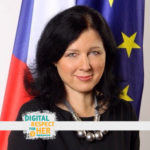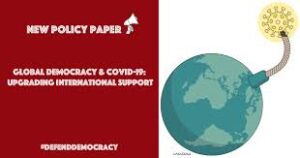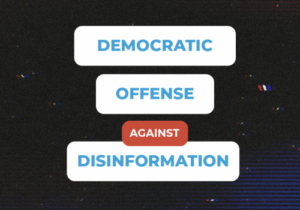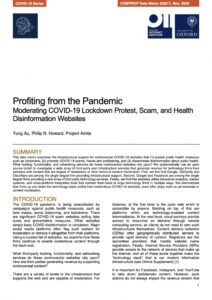In the 20th century democracies were defined by freedom of expression, pluralism and the metaphor of a ‘marketplace of ideas’, and authoritarian regimes by censorship and state media control, the LSE’s Institute of Global Affairs observes. Today, however, we see authoritarians and ‘hybrid’ regimes multiplying content rather than constricting it: flooding the information space with unprecedented amounts of digitally powered disinformation, and undermining critics with cyber militias and online mobs. Meanwhile inside democracies pluralism is tipping into polarization so extreme it breaks down the possibility for deliberative debate.
The report, “Profiting from the Pandemic,” published this week by Oxford’s Computational Propaganda Project, suggests these companies could do more, the Post adds.
“They’ve made the first step in doing content moderation,” said Philip N. Howard, principal investigator for the project and a co-author of the report along with Oxford researcher Yung Au. “The next step is to withdraw the back-end services that enable covid misinformation and fraudulent scams.”
“We Must Save Democracy From Conspiracies,” insisted British comedian Sacha Baron Cohen in a Time magazine article from Oct. 8, 2020. “If Facebook were around in the 1930s, it would have allowed Hitler to post 30-second ads on his solution to ‘the Jewish problem’,” he said. Baron Cohen accused Facebook of being “the greatest propaganda machine in history,” due to the platform’s failure to remove disinformation, notes Jacob Mchangama, the executive director of Justitia, a Copenhagen based think tank focusing on human rights and the rule of law.
Long gone are the early days of utopian techno-optimism infused by American First Amendment ideals that turbocharged the spread of hate and hoaxes and clashed with the values of the rest of the world, including European democracies,  he writes for Foreign Policy.
he writes for Foreign Policy.
The European Commission’s European Democracy Action Plan aims to tackle problems of disinformation and online political advertising and to strengthen Europe’s media ecosystem. But can the action plan deliver on its promise to improve European democracy? Carnegie’s Richard Youngs asks Commission Vice-President Věra Jourová (right) in the discussion above.
The initiatives, dubbed the European Democracy Action Plan (EDAP) and Media and Audiovisual Action Plan (MAAP) respectively, come roughly two weeks before Brussels is expected to publish a separate set of legislative proposals that will target the dominance of a few, mostly American, tech companies and place greater responsibilities on social media companies about what is posted on their networks, adds POLITICO, which broke down the important parts of the announcement.
The European Union should focus on strengthening the quality of democracy and governance as the most powerful potential bulwark against disinformation, a new analysis suggests. The study, Mapping Fake News and Disinformation in the Western Balkans and Identifying Ways to Effectively Counter Them, examines closely the “endemic and ubiquitous” use of disinformation in the region and attempts to gauge its impact, including on elections and referenda, as well as attitudes to the COVID-19 pandemic and the EU itself. Conducted at the request of the European Parliament’s Foreign Policy Committee (AFET), it states that disinformation is an endemic and ubiquitous part of politics throughout the Western Balkans, without exception.
Generally, democracies lack a developed toolkit of actions for supporting pro-democracy movements and remain on defense when authoritarian regimes initiate crackdown against peaceful protesters, notes Dr. Maciej Bartkowski, Senior Advisor at the International Center on Nonviolent Conflict. His new guide – How Democratic States Can Effectively Support Pro-Democracy Movements – was partly written as a response to reactive and relatively limited nature of support that western countries offered to the ongoing nonviolent struggle in Belarus. Other guides in the series include Defending the Truth: An Activist’s Guide to Fighting Foreign Disinformation Warfare.
 “Covid-19 is a communications crisis. It’s not simply a pandemic. It’s an infodemic and this has cost lives,” said UN General Assembly President Volkan Bokzir. But when it comes to dismissing the threat posed by the pandemic, two countries are in a league of their own – the world’s worst dictatorships, Coda Story reports:
“Covid-19 is a communications crisis. It’s not simply a pandemic. It’s an infodemic and this has cost lives,” said UN General Assembly President Volkan Bokzir. But when it comes to dismissing the threat posed by the pandemic, two countries are in a league of their own – the world’s worst dictatorships, Coda Story reports:
- According to the authorities, coronavirus never reached Turkmenistan…After months of denial and refusing to allow the WHO into the country, officials could no longer deny persistent reports of people dying of pneumonia-like symptoms. They said these cases were caused first by toxic dust, then seasonal influenza.
- North Korea’s regime also officially maintains there have been no Covid-19 infections within its borders. To keep the virus out, the government locked down entire cities and counties, canceled major events and banned travel between provinces. Authorities also publicly executed a violator of the lockdown measures. Yet an anonymous source in the city of Manpo, near the Chinese border, told the South Korea-based Daily NK that some 100 people have died after showing coronavirus symptoms.
 DFRLab this week launched a joint report with the Center for European Policy Analysis (CEPA, a partner of the National Endowment for Democracy) that recommends a democratic offense against disinformation – i.e., a more proactive approach to combating disinformation among Western democracies.
DFRLab this week launched a joint report with the Center for European Policy Analysis (CEPA, a partner of the National Endowment for Democracy) that recommends a democratic offense against disinformation – i.e., a more proactive approach to combating disinformation among Western democracies.
EU DisinfoLab has published its research tracking misogynistic disinformation during Covid-19, by researcher Maria Giovanna Sessa. This report adopts a disinformation methodological lens to analyse examples of gendered disinformation that relies on negative depictions of women.
The principles underpinning a democratic information environment need to be reimagined for the digital age, the LSE’s IGA adds. What sort of oversight and control do we need over algorithms and the design of online platforms? How can we reinvent media to overcome polarisation? Can democracies build coalitions to withstand the authoritarian threat?
The #LSEMaryamForum: Democracy and Disinformation. Hosted by the Institute of Global Affairs and the School of Public Policy and the Centre for Economic Policy Research. RSVP
 Panelists:
Panelists:
- Chloe Colliver (@ChloeColliver2) is Head of Digital Policy and Strategy at the Institute for Strategic Dialogue (ISD).
- James Deane (@JamesMDeane) is Director of Policy and Research at BBC Media Action, the BBC’s international media support charity.
- Sophia Gaston (@sophgaston) is a social and political researcher covering public opinion, social and political change, populism, the media and democracy.
- Delphine Halgand-Mishra (@DelphineHalgand) is the Executive Director of The Signals Network, a non-profit organization which supports whistleblowers who have shared major public interest information with the press.
- Peter Pomerantsev (@peterpomeranzev), author of This Is Not Propaganda…. currently serves as Visiting Senior Fellow at the Institute of Global Affairs and Co-Director of the Arena disinformation think tank at LSE.
- Shawn Powers (@shawnpowers) serves as the U.S. Agency for Global Media’s (USAGM) Chief Strategy Officer, leading its international engagement, strategic planning, strategic initiatives, and partnerships with key stakeholders.

 The 120 websites studied by the Oxford researchers support protests against government health restrictions or spread misleading information about covid — false cures, fake charities or misleading health advice. These sites use web hosting, ad-tracking services, web development tools and social media links from leading technology companies. Some of the tools are free “widgets” or bits of computer code that allow web designers to expand the capabilities of their sites and are used widely across the Internet, often without the companies that produce them knowing who is deploying them
The 120 websites studied by the Oxford researchers support protests against government health restrictions or spread misleading information about covid — false cures, fake charities or misleading health advice. These sites use web hosting, ad-tracking services, web development tools and social media links from leading technology companies. Some of the tools are free “widgets” or bits of computer code that allow web designers to expand the capabilities of their sites and are used widely across the Internet, often without the companies that produce them knowing who is deploying them “The Jigsaw study reminds us that the
“The Jigsaw study reminds us that the 





